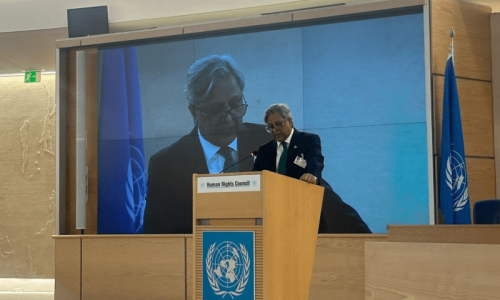WASHINGTON: The United States is not asking Saudi Arabia to choose between Washington and Beijing, but it does see Chinese President Xi Jinping’s visit to the country as an attempt to exert influence in the region.
The comments came at two separate briefings this week at the White House and the State Department as Mr Xi completed his two-day visit to Saudi Arabia.
”It’s certainly not a surprise that President Xi is travelling around,” John Kirby, spokesperson for the White House National Security Council, told reporters on Wednesday. “We are mindful of the influence that China is trying to grow around the world.”
The State Department, however, was more elaborate. “We are not asking countries to choose between the United States and the People’s Republic of China,” said the department’s spokesperson Ned Price when asked to comment on the visit.
“Our goal is to give countries the most attractive choice and to make the United States the most attractive choice in terms of what we bring to the table.”
Mr Price focused particularly on America’s defence ties with various Middle East countries, adding that no country could match America in the region “when it comes … integrating the defensive capabilities that are so important, so vital to many of our partners across the Middle East”.
The American media, however, underlined Riyadh’s desire to reduce its dependence on Washington while reporting about Mr Xi’s visit, and the warm welcome he received in Saudi Arabia.
In an analytical piece on the visit, the Foreign Policy magazine referred to a 2004 interview then-Saudi foreign minister Saud al Faisal gave to a former Washington Post journalist, David Ottaway.
In that interview, Mr Faisal said the US-Saudi relationship wasn’t a “Catholic marriage” where only one wife was allowed; it was a “Muslim marriage” where four wives were permitted. “Saudi Arabia is not seeking divorce from the United States; it is just seeking marriage with other countries,” Mr Ottaway wrote.
The Wall Street Journal noted that the visit allowed the world’s top oil importer to “deepen (its) relations with the top exporter.”
The report pointed out that Xi Jinping and King Salman signed a comprehensive strategic partnership agreement affording Riyadh top-tier status in China’s foreign relations. The two leaders also pledged to visit each other every two years.
The two countries signed dozens of commercial agreements, initially valued at more than $29 billion, in sectors such as clean energy, technology and manufacturing.
Those include setting up a Huawei cloud-computing region, building an electric-vehicle manufacturing plant in Saudi Arabia and supplying green hydrogen batteries for a futuristic Saudi city.
The Foreign Policy, however, noted that Beijing cannot replace Washington on the issue that “matters most to the Saudis: their security in a rough neighbourhood”.
But the report warned that “the days of Riyadh’s monogamous marriage with Washington are probably” over. In today’s Cold War 2.0 and the competition with China and Russia – “not only will Saudis refuse to choose sides, but (are) also likely to move closer to Beijing and Moscow as (their) interests warrant”.
The New York Times noted that Mr Xi’s visit “highlights Beijing’s renewed bid to compete with Washington after years of preoccupation with the pandemic” and that the visit ended the Chinese’s leader’s “diplomatic isolation”.
Published in Dawn, December 10th, 2022













































